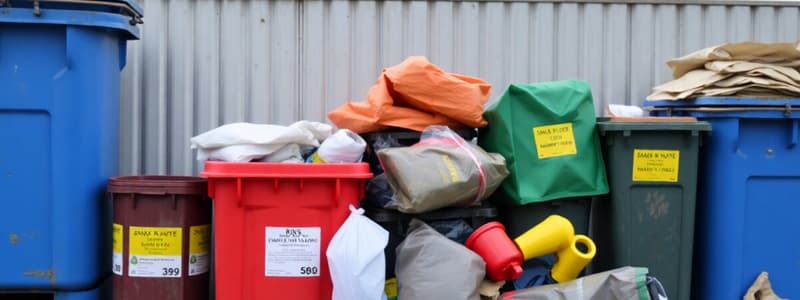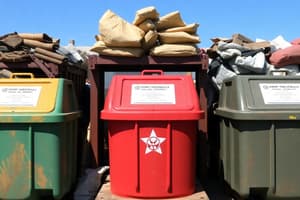Podcast
Questions and Answers
What is a key benefit of regular training and education for employees on waste management practices?
What is a key benefit of regular training and education for employees on waste management practices?
- Reduces costs
- Increases waste generation
- Limits recycling efforts
- Fosters a culture of compliance (correct)
Monitoring and auditing of waste management practices helps identify areas for improvement.
Monitoring and auditing of waste management practices helps identify areas for improvement.
True (A)
What role does community engagement play in waste management?
What role does community engagement play in waste management?
It fosters awareness and encourages responsible disposal practices.
Engaging with the community on waste management issues promotes ______ programs.
Engaging with the community on waste management issues promotes ______ programs.
Which of the following practices is essential for ensuring compliance in waste management?
Which of the following practices is essential for ensuring compliance in waste management?
Waste-to-energy systems are an outdated trend in waste management.
Waste-to-energy systems are an outdated trend in waste management.
Describe one emerging trend in waste management.
Describe one emerging trend in waste management.
A comprehensive understanding of ______ is necessary for effective waste disposal.
A comprehensive understanding of ______ is necessary for effective waste disposal.
Match the following terms with their descriptions:
Match the following terms with their descriptions:
What is an expected advantage of companies supporting local recycling initiatives?
What is an expected advantage of companies supporting local recycling initiatives?
Which of the following types of waste requires specific disposal methods for compliance?
Which of the following types of waste requires specific disposal methods for compliance?
Non-compliance with waste management regulations can lead to minimal consequences for the environment.
Non-compliance with waste management regulations can lead to minimal consequences for the environment.
Name one key regulation related to waste management.
Name one key regulation related to waste management.
The _____ Act aims to protect the quality of air in relation to waste management.
The _____ Act aims to protect the quality of air in relation to waste management.
Match the waste types with their examples:
Match the waste types with their examples:
What is a crucial aspect of ensuring compliance with waste management?
What is a crucial aspect of ensuring compliance with waste management?
Understanding government regulations is not necessary for effective waste management.
Understanding government regulations is not necessary for effective waste management.
What is one of the proper disposal methods for hazardous materials?
What is one of the proper disposal methods for hazardous materials?
Effective waste management helps in protecting public health and the _____ .
Effective waste management helps in protecting public health and the _____ .
Why is it important for organizations to develop clear waste management procedures?
Why is it important for organizations to develop clear waste management procedures?
Flashcards
Waste Management Training
Waste Management Training
Training and education on waste management practices helps employees understand and comply with regulations.
Waste Management Monitoring
Waste Management Monitoring
Regularly checking how waste is managed and making sure it follows the rules.
Waste Management Auditing
Waste Management Auditing
Auditing waste management practices helps identify areas for improvement.
Community Engagement in Waste Management
Community Engagement in Waste Management
Signup and view all the flashcards
Waste Management Compliance
Waste Management Compliance
Signup and view all the flashcards
Waste Management Best Practices
Waste Management Best Practices
Signup and view all the flashcards
Waste-to-Energy Systems
Waste-to-Energy Systems
Signup and view all the flashcards
Advanced Recycling Technologies
Advanced Recycling Technologies
Signup and view all the flashcards
Future Trends in Waste Management
Future Trends in Waste Management
Signup and view all the flashcards
Sustainability in Waste Management
Sustainability in Waste Management
Signup and view all the flashcards
Waste Management
Waste Management
Signup and view all the flashcards
Waste Categorization
Waste Categorization
Signup and view all the flashcards
Proper Waste Disposal
Proper Waste Disposal
Signup and view all the flashcards
Waste Management Regulations
Waste Management Regulations
Signup and view all the flashcards
Resource Conservation and Recovery Act (RCRA)
Resource Conservation and Recovery Act (RCRA)
Signup and view all the flashcards
Document Interpretation
Document Interpretation
Signup and view all the flashcards
Effective Document Interpretation
Effective Document Interpretation
Signup and view all the flashcards
Waste Management Strategies
Waste Management Strategies
Signup and view all the flashcards
Employee Training
Employee Training
Signup and view all the flashcards
Study Notes
Ensuring Compliance: Best Practices for Waste Management
- Waste management is crucial for environmental sustainability
- Proper disposal methods, understanding government regulations, and effective document interpretation are key aspects of responsible waste management
- Compliance with waste management regulations is essential for protecting public health and the environment
- Non-compliance can lead to severe penalties and environmental degradation
- Understanding the importance of compliance is the first step towards effective waste management
Types of Waste
- Waste can be categorized into hazardous, non-hazardous, recyclable, and organic waste
- Each waste type requires specific disposal methods to ensure safety and compliance with regulations
- Understanding these categories is vital for proper waste management
Proper Disposal Methods
- Implementing proper disposal methods (recycling, composting, safe disposal of hazardous materials) is crucial for effective waste management
- Organizations must develop clear procedures to ensure compliance and minimize environmental impact
Government Regulations Overview
- Government regulations on waste management vary by region, but generally aim to protect the environment and public health
- Familiarity with regulations is essential for businesses to avoid penalties and ensure compliance with local, state, and federal laws
Key Regulations to Follow
- Key regulations include the Resource Conservation and Recovery Act (RCRA), Clean Air Act, and Clean Water Act
- Understanding these laws helps organizations develop effective waste management strategies that comply with legal requirements and promote sustainability
Document Interpretation Skills
- Effective document interpretation (waste manifests, regulatory guidelines, safety data sheets) is critical for compliance
- Staff training on these skills ensures that everyone can contribute to proper waste management practices
Training and Education
- Regular training and education for employees on waste management practices and regulations are essential
- This fosters a culture of compliance and ensures that all staff members are aware of their responsibilities regarding waste disposal
Monitoring and Auditing
- Implementing regular monitoring and auditing of waste management practices helps identify areas for improvement
- This proactive approach ensures compliance and enhances the effectiveness of waste disposal methods within the organization
Community Engagement
- Engaging with the community on waste management issues fosters awareness and encourages responsible disposal practices
- Organizations can support local initiatives and promote recycling programs, thereby enhancing compliance and sustainability efforts
Conclusion
- Ensuring compliance in waste management requires a comprehensive understanding of disposal methods, government regulations, and effective document interpretation
- By implementing best practices, organizations can contribute to a healthier environment and a sustainable future
Future Trends in Waste Management
- As technology evolves, new trends in waste management are emerging
- Innovations (waste-to-energy systems, advanced recycling technologies) are shaping the future of compliance and sustainability in waste disposal
Studying That Suits You
Use AI to generate personalized quizzes and flashcards to suit your learning preferences.
Related Documents
Description
Explore the essential practices for maintaining compliance in waste management. This quiz covers the types of waste, proper disposal methods, and the regulations that ensure environmental sustainability and public health. Test your knowledge on how compliance protects our environment and how to effectively manage waste types.




